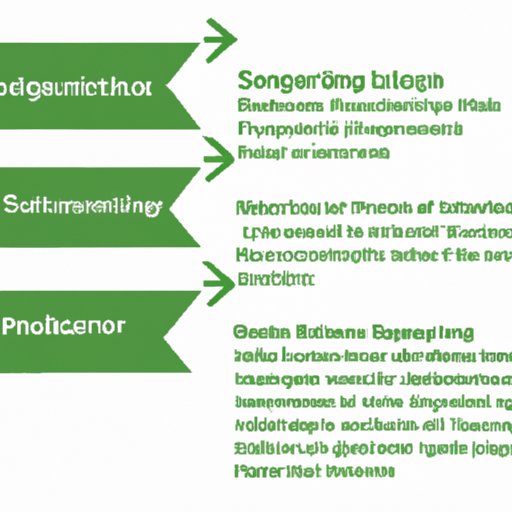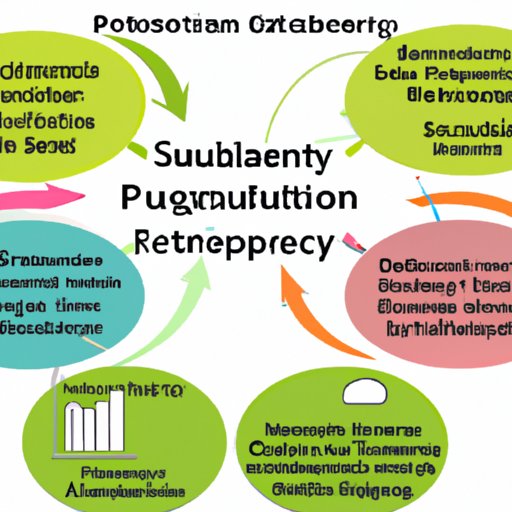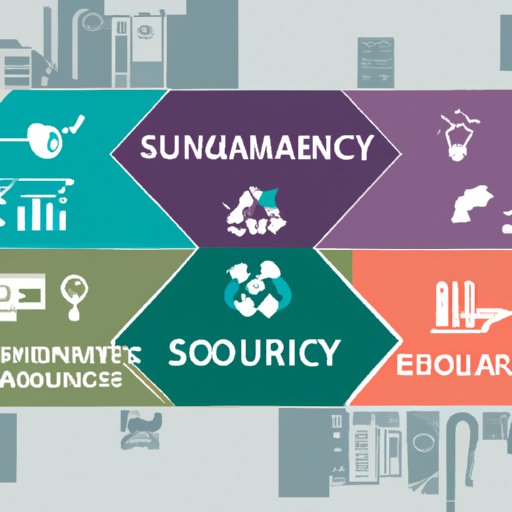Introduction
Sustainability is a concept that has become increasingly important in recent years. In environmental science, it refers to practices that reduce the impact of human activity on the environment. By understanding the implications of unsustainable practices and implementing sustainable solutions, we can ensure that our planet remains healthy and habitable for generations to come.
Definition of Sustainability in Environmental Science
According to the United Nations Environment Programme, sustainability is “the ability to meet the needs of the present without compromising the ability of future generations to meet their own needs.” In other words, it is about ensuring that our activities today do not negatively affect the environment or the people who live in it tomorrow. This encompasses a wide range of topics, including natural resource management, pollution, waste disposal, energy production, and more.
Overview of the Problem
Our current methods of production, consumption, and disposal are not sustainable. According to a study by the World Resources Institute, global resource use has increased by nearly 70 percent since 1970. The same study found that humans are using natural resources at a rate faster than the Earth can replenish them. At this rate of consumption, many natural resources will be depleted in the near future, leading to serious environmental and economic consequences.

Examining the Impact of Sustainability on the Environment
In order to understand the importance of sustainability, we must first examine how it affects the environment. The following sections explore how sustainable practices can reduce the impact of human activity on the environment.
How Sustainability Affects Natural Resources
Sustainable practices help ensure that natural resources are used responsibly. This includes reducing the use of water, land, and energy, as well as managing waste and pollution. For example, one way to conserve water is to use efficient irrigation systems that reduce water consumption while still providing adequate nutrition to crops. Sustainable farming practices also help preserve soil health and reduce the need for chemical fertilizers and pesticides.
Economic Impact of Sustainable Practices
Sustainable practices can also have a positive economic impact. For example, renewable sources of energy such as solar and wind power can help reduce dependence on fossil fuels, which not only reduces emissions but also helps create jobs in the clean energy sector. Additionally, sustainable practices can help reduce the cost of production by reducing the need for costly materials and labor.

Exploring the Benefits of Sustainable Practices
In addition to reducing the impact of human activity on the environment, sustainable practices also offer numerous benefits. The following sections explore some of the most significant ones.
Improved Quality of Life
Sustainable practices can have a positive effect on quality of life. For instance, reducing air pollution can improve public health by reducing the incidence of respiratory diseases. Additionally, preserving natural habitats can provide recreational opportunities, such as hiking and bird watching, which can increase physical activity and mental wellbeing.
Healthier Ecosystems
Sustainable practices can also help create healthier ecosystems. For instance, preserving natural habitats can protect species from extinction, while reducing pollution can decrease the acidification of oceans and rivers. Additionally, reducing the amount of waste produced can help reduce the burden on landfills, which can in turn reduce the amount of toxic chemicals released into the environment.
Reduction in Pollution and Waste
Finally, sustainable practices can help reduce pollution and waste. For example, promoting the use of reusable bags and containers can help reduce the amount of single-use plastics produced, while encouraging the use of renewable sources of energy can help reduce emissions. Additionally, composting organic waste can reduce the amount of landfill waste and create nutrient-rich soil for gardening.
The Role of Technology in Achieving Sustainability
Technology plays an important role in achieving sustainability. The following sections explore some of the ways in which technology can help.
Automation and Efficiency
Technologies such as automation and artificial intelligence can help reduce the amount of time and energy needed to complete tasks. For instance, automated irrigation systems can help farmers save time and energy by automatically distributing water to crops. Additionally, AI-powered analytics can help companies identify areas where they can reduce their energy consumption, resulting in greater efficiency.
Data-Driven Decision Making
Data-driven decision making is essential for achieving sustainability. Technologies such as sensors and machine learning can help collect data on resource usage and environmental conditions, which can then be used to make informed decisions. Additionally, data-driven insights can help identify potential risks and opportunities, allowing for better planning and preparation.
Smart Technologies
Finally, smart technologies can help reduce the impact of human activity on the environment. For example, smart meters can help monitor energy usage and alert users when they are consuming too much. Additionally, connected devices can help reduce waste by automatically ordering new supplies when needed, eliminating the need for excess packaging.
Analyzing the Challenges of Implementing Sustainable Practices
While there are many benefits to implementing sustainable practices, there are also numerous challenges. The following sections explore some of the most common ones.
Financial Barriers
One of the biggest challenges to implementing sustainable practices is the cost. Many sustainable solutions require significant upfront investments, which can be difficult for companies and individuals to afford. Additionally, the long-term savings from these solutions may not be immediately apparent, making it difficult to justify the cost.
Lack of Expertise
Another challenge is the lack of expertise. Many sustainable solutions require specialized skills and knowledge, which can be difficult to find. Additionally, many organizations lack the resources to hire and train employees on sustainable practices.
Resistance to Change
Finally, there is often resistance to implementing sustainable practices. This can be due to a variety of factors, including a lack of understanding of the benefits, fear of the unknown, and a reluctance to change established processes. Overcoming this resistance is key to successfully implementing sustainable solutions.

Case Studies of Successful Sustainability Initiatives
In order to understand the impact of sustainable practices, it is important to look at case studies of successful initiatives. The following sections explore some examples of successful sustainability initiatives and the lessons learned from them.
Examples of Sustainable Practices
One example of a successful sustainability initiative is the city of Copenhagen’s “Green Wave” project. This project involved introducing bike lanes, green roofs, and other sustainable solutions to reduce the city’s carbon footprint. As a result of these efforts, the city was able to reduce its emissions by 25 percent in just four years.
Benefits of Implementing Sustainable Practices
The success of the Green Wave project demonstrates the potential benefits of implementing sustainable practices. In addition to reducing emissions, the project also created jobs, improved public health, and fostered a sense of pride among citizens. These benefits demonstrate the potential of sustainable solutions to improve quality of life.
Lessons Learned From Successful Initiatives
The success of the Green Wave project also provides valuable lessons for other organizations. For instance, it highlights the importance of collaboration between stakeholders, such as government, businesses, and citizens, in order to achieve success. Additionally, it illustrates the potential of data-driven decision making and the use of technology to implement sustainable solutions.
Conclusion
Sustainability is an important concept in environmental science, and it is essential for preserving the environment and ensuring a healthy future for generations to come. By understanding the implications of unsustainable practices and implementing sustainable solutions, we can reduce the impact of human activity on the environment and enjoy the numerous benefits that come with it. Through case studies of successful initiatives, we can learn how to overcome the challenges of implementing sustainable practices and reap the rewards of a healthier planet.

Summary of the Importance of Sustainability
Sustainability is essential for protecting the environment and ensuring a healthy future for generations to come. By understanding the implications of unsustainable practices and implementing sustainable solutions, we can reduce the impact of human activity on the environment and enjoy the numerous benefits that come with it. Through case studies of successful initiatives, we can learn how to overcome the challenges of implementing sustainable practices and reap the rewards of a healthier planet.
Call to Action
It is up to all of us to take action and make a difference. We can start by educating ourselves on the issues surrounding sustainability and exploring ways to reduce our own impact on the environment. Additionally, we can support organizations and initiatives that promote sustainable practices, such as renewable energy projects and conservation efforts. Together, we can create a brighter, more sustainable future.
(Note: Is this article not meeting your expectations? Do you have knowledge or insights to share? Unlock new opportunities and expand your reach by joining our authors team. Click Registration to join us and share your expertise with our readers.)
